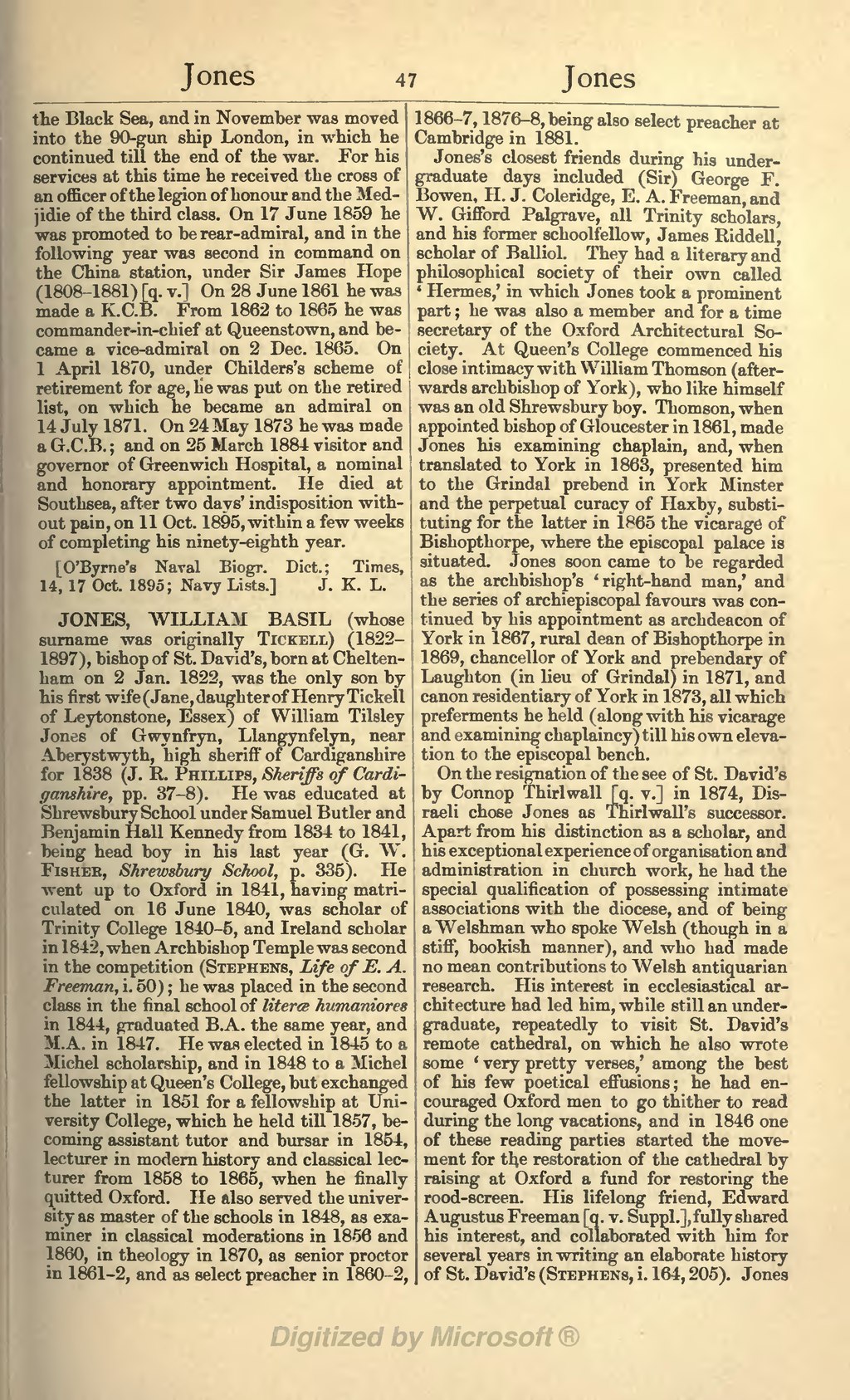the Black Sea, and in November was moved into the 90-gun ship London, in which he continued till the end of the war. For his services at this time he received the cross of an officer of the legion of honour and the Medjidie of the third class. On 17 June 1859 he was promoted to be rear-admiral, and in the following year was second in command on the China station, under Sir James Hope (1808–1881) [q. v.] On 28 June 1861 he was made a K.C.B. From 1862 to 1865 he was commander-in-chief at Queenstown, and became a vice-admiral on 2 Dec. 1865. On 1 April 1870, under Childers's scheme of retirement for age, he was put on the retired list, on which he became an admiral on 14 July 1871. On 24 May 1873 he was made a G.C.B.; and on 25 March 1884 visitor and governor of Greenwich Hospital, a nominal and honorary appointment. He died at Southsea, after two days' indisposition without pain, on 11 Oct. 1895, within a few weeks of completing his ninety-eighth year.
[O'Byrne's Naval Biogr. Dict.; Times, 14, 17 Oct. 1895; Navy Lists.]
JONES, WILLIAM BASIL (whose surname was originally Tickell) (1822–1897), bishop of St. David's, born at Cheltenham on 2 Jan. 1822, was the only son by his first wife (Jane, daughter of Henry Tickell of Leytonstone, Essex) of William Tilsley Jones of Gwynfryn, Llangynfelyn, near Aberystwyth, high sheriff of Cardiganshire for 1838 (J. R. Phillips, Sheriffs of Cardiganshire, pp. 37–8). He was educated at Shrewsbury School under Samuel Butler and Benjamin Hall Kennedy from 1834 to 1841, being head boy in his last year (G. W. Fisher, Shrewsbury School, p. 335). He went up to Oxford in 1841, having matriculated on 16 June 1840, was scholar of Trinity College 1840–5, and Ireland scholar in 1842, when Archbishop Temple was second in the competition (Stephens, Life of E. A. Freeman, i. 50); he was placed in the second class in the final school of literæ humaniores in 1844, graduated B.A. the same year, and M.A. in 1847. He was elected in 1845 to a Michel scholarship, and in 1848 to a Michel fellowship at Queen's College, but exchanged the latter in 1851 for a fellowship at University College, which he held till 1857, becoming assistant tutor and bursar in 1854, lecturer in modern history and classical lecturer from 1858 to 1865, when he finally quitted Oxford. He also served the university as master of the schools in 1848, as examiner in classical moderations in 1856 and 1860, in theology in 1870, as senior proctor in 1861–2, and as select preacher in 1860–2, 1866–7, 1876–8, being also select preacher at Cambridge in 1881.
Jones's closest friends during his undergraduate days included (Sir) George F. Bowen, H. J. Coleridge, E. A. Freeman, and W. Gifford Palgrave, all Trinity scholars, and his former schoolfellow, James Riddell, scholar of Balliol. They had a literary and philosophical society of their own called 'Hermes,' in which Jones took a prominent part; he was also a member and for a time secretary of the Oxford Architectural Society. At Queen's College commenced his close intimacy with William Thomson (afterwards archbishop of York), who like himself was an old Shrewsbury boy. Thomson, when appointed bishop of Gloucester in 1861, made Jones his examining chaplain, and, when translated to York in 1863, presented him to the Grindal prebend in York Minster and the perpetual curacy of Haxby, substituting for the latter in 1865 the vicarage of Bishopthorpe, where the episcopal palace is situated. Jones soon came to be regarded as the archbishop's 'right-hand man,' and the series of archiepiscopal favours was continued by his appointment as archdeacon of York in 1867, rural dean of Bishopthorpe in 1869, chancellor of York and prebendary of Laughton (in lieu of Grindal) in 1871, and canon residentiary of York in 1873, all which preferments he held (along with his vicarage and examining chaplaincy) till his own elevation to the episcopal bench.
On the resignation of the see of St. David's by Connop Thirlwall [q. v.] in 1874, Disraeli chose Jones as Thirlwall's successor. Apart from his distinction as a scholar, and his exceptional experience of organisation and administration in church work, he had the special qualification of possessing intimate associations with the diocese, and of being a Welshman who spoke Welsh (though in a stiff, bookish manner), and who had made no mean contributions to Welsh antiquarian research. His interest in ecclesiastical architecture had led him, while still an undergraduate, repeatedly to visit St. David's remote cathedral, on which he also wrote some 'very pretty verses,' among the best of his few poetical effusions; he had encouraged Oxford men to go thither to read during the long vacations, and in 1846 one of these reading parties started the movement for the restoration of the cathedral by raising at Oxford a fund for restoring the rood-screen. His lifelong friend, Edward Augustus Freeman [q. v. Suppl.], fully shared his interest, and collaborated with him for several years in writing an elaborate history of St. David's (Stephens, i. 164, 205). Jones
